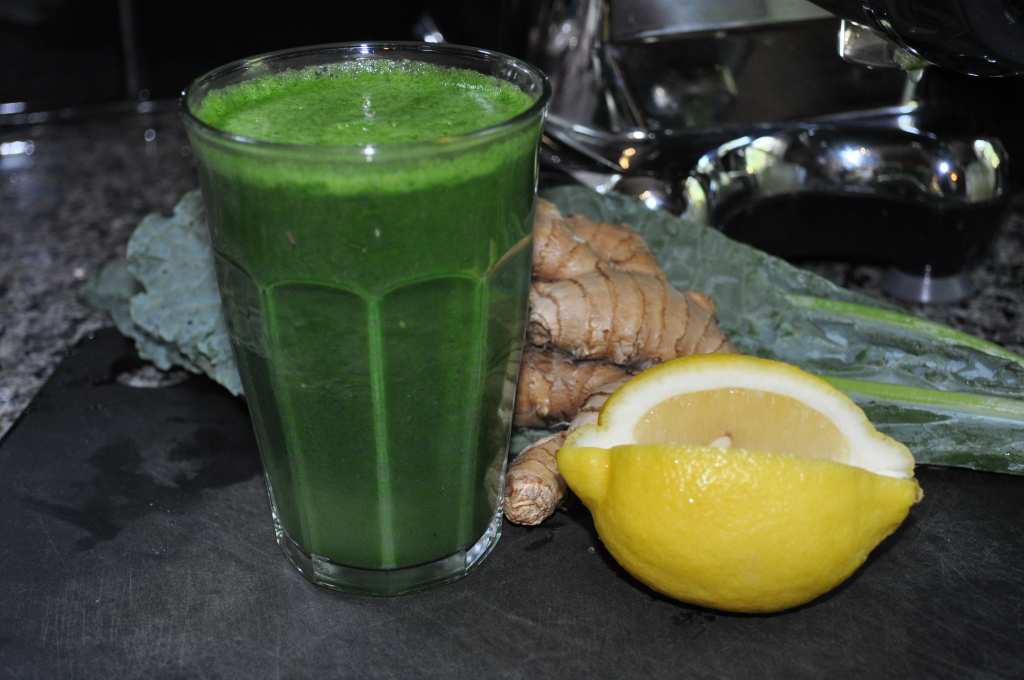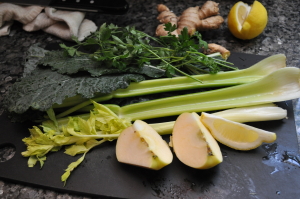 Green juice with kale, lemon, celery and ginger
Green juice with kale, lemon, celery and ginger
Do you feel like this poor guy, with stress practically coming out your ears? With our go-go-go lifestyle and constant demands on your attention, it’s easy to start feeling overrun with stress. The result can be emotional, physical, and sometimes chronic symptoms, such as the following:

- fatigue
- irritable mood
- sugar and coffee cravings
- anxiety or depression
- increase in colds, flu, and/or infections
- chronic inflammation, pain, and/or headaches
- weight gain, especially in the midsection
Stress increases the circulation of the “stress hormones” cortisol, adrenaline, and norepinephrine, and chronically high levels wreak havoc on your body’s processes, causing discomfort, weight gain, and decreased immunity. Long-term this can increase your risk for getting cancer, heart disease, and other chronic health problems.
The good news is that you can do something about it. I tell my health coaching clients to view stress as weights on one side of a scale. Sometimes you can decrease your stressors – lighten that side of the scale. But sometimes that’s not possible, so when you can’t decrease it, counter-balance it. Build up the other side of the scale with things that decrease stress.
That’s where food comes in. Food has the unique ability to increase or decrease the burden of stress on your body. If you eat the wrong foods they will add stress – sugar, refined carbs, low-quality meats and dairy all contribute to inflammation and an acidic environment. Too many chemicals add to the burden on your kidneys and liver, your detoxification organs, which can only handle so much. And eating a lot of high-glycemic index foods high in sugars and refined carbs stresses your pancreas and puts your body on a hormonal roller-coaster.
Stress-reducing foods do the complete opposite and help your body to detoxify. Dark leafy greens such as kale and collard greens flush the body with nutrients and help to restore an alkaline pH. Richly colored fruits and vegetables such as berries, greens, and squashes are high in antioxidants such as carotenoids that prevent damage to your cells that can ultimately lead to disease. And good fats like omega-3 fatty acids, found in fatty fish such as wild salmon, can benefit you physically and emotionally by reducing inflammation and improving your mood.
The next time you’re feeling stressed try my top 5 tips for reducing stress with food:
- Drink green juice made with fresh green vegetables, including leafy greens: It’s simply the most efficient way of getting the most nutrients into your body, fast. Some people report a near-immediate boost in energy and mood. This is my favorite juicer – it has an impressive 15 year warranty and cleans up in about 2 minutes. I’m cool with blending, too.
- Up your omega-3 fatty acid intake: You can take supplements of course, these are my favorite, but it’s tasty to choose high-quality fish such as wild salmon or lake trout for a few meals each week.
- Snack on high-color, low-sugar fruits and veggies: Berries get the gold star in this category, but also great are apples, carrots, and even (baked) sweet potato fries.
- Try to cut down on low-quality junk food: I’m talking about the food that makes you feel bad after you eat it and is so junky you don’t even necessarily enjoy it. I’m all about an authentic treat made with real ingredients, but adding more toxins to your body when you’re already stressed is going to exacerbate the situation, physically and mentally.
- Slow down and treat yourself to a relaxing, satisfying meal: Whether you prepare it yourself or go out to a nice dinner with a friend, slowing down is key. Good food paired with good company is restorative. Taste your food, focus on the positive things in your life, and live in the pleasantness of the moment.

